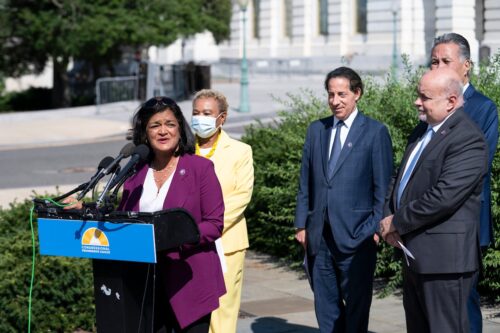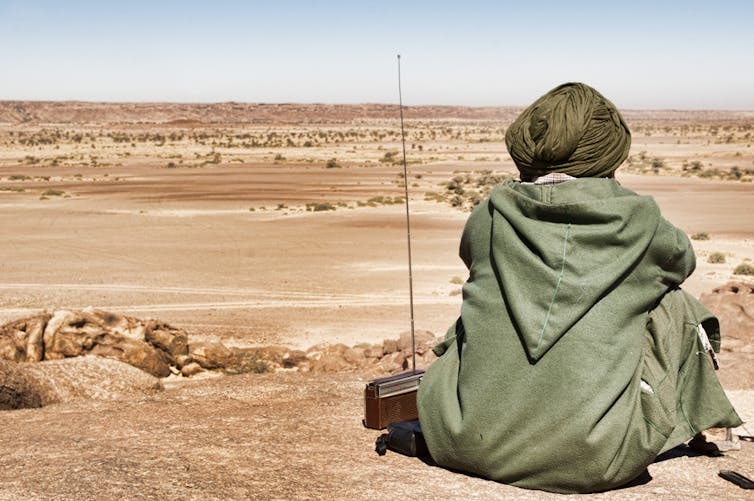GEOFOR: How do you see the outcome of the elections: is this a victory for the Republicans or a failure for the Democrats?
Peter Koenig: So far, to the surprise of most people, there are no clear results yet of the US Midterm Elections. The Republicans have won the House of representatives, where they already had a majority before, but the Senate is not decided yet. In three States, Georgia, Arizona and Nevada, the ballots are still being counted, or they will head for a run-off on 6 December 2022.
The results are too close to call a winner. There will be run-off elections on 6 December 2022. It is still possible that the Republicans may win a razor-thin majority in the Senate. That would mean, taking over both Chambers and putting Joe Biden in a “lame duck” position.
For the past two years the Senate was evenly divided 50:50, with a “majority” for the Dems, because the Vice-President (Democrat) may cast the deciding vote.
What can clearly be said, there was no “Wave of Red” – Red standing for Republicans, as was expected and was unfailingly indicated by all the predictive polls.
In that sense – just looking at the surface – the elections were a victory for the Dems.
But there is more to it. This “victory” is more than surprising. Many serious analysts and particularly Republican politicians, as well as independent media and journalists are talking about voter fraud.
Former President Trump was the first to express his doubts about fair elections. Frankly, judging by the election preceding polls, they may have a point. Problems with voting equipment have been reported from Arizona and Michigan. Voter intimidation was also reported from several States, including Georgia and Michigan.
More may surface as time goes by. It is highly unusual that predictive polls are so far from the actual vote.
Voter fraud was also an issue in the 2020 Presidential Elections. It is said that President Trump and his lawyers have proof that Trump won by at least 2 million votes. Some put the figures much higher.
Interestingly, none of the State Courts where Trump’s lawyers attempted to present his case – nor the US Supreme Court — accepted even to look at his documentation. This is more than strange, suspicious.
Also, the very unusual refusal by a State or even Supreme Court not even looking at a former President’s case, has never been heard of before.
GEOFOR: What role was played by the administration and personally by President Joe Biden in the defeat of the Democrats?
PK: That will be an interesting question to answer, when the final results will be in, three weeks from now.
What can already be said – Biden is a “non-President”. Unfortunately, he is not apt for this position. He is often confused, doesn’t know what he is talking about – and even at this point, with two years into his Presidency, he is hinting at running again in 2024.
Mind you, this had all been planned. The Globalists, those who believe, or dream, they will eventually run the world under a One World Order (OWO), those even behind and above the Washington Government, needed a hapless Joe Biden, who will do the bidding of those who call the shots.
Therefore, it would be a miracle, if the run-off elections would favor the Republicans, hence giving both Senate and House of Representatives to the Republicans.
And that even with a majority of Democrats, of the American public – and European, for that matter – because the vast majority of the people do not agree with an OWO, they do not approve of the tyrannical dictatorship behind Globalism.
This applies to the entire world.
Allow me to talk from my experience as a World Bank economist, having worked in many countries around the globe, mostly the Global South, Globalization has done a lot of harm to them, to the majority of people, has indebted them, made them vulnerable for ever-more and ever unfairer deals of exploitation. Globalisation has impoverished people – everywhere – and is hellbent to continue doing so.
Therefore, the Democrats in the US and the socialists or left-leaning parties around the globe, have all been sold to globalism. As Klaus Schwab, eternal CEO of the WEF proudly says, “with our Young Global Leaders (YGL) Program we were able to infiltrate every Government of the world”.
Unfortunately, he is right. Take Justin Trudeau, one of Schwab’s darlings, a YGL graduate, was elected under a social-democrat ticket. Look at him today. He is the worst neoliberal tyrant Canada has ever known.
The same all over Europe. Literally every “leader” of EU member countries, is a YGL graduate. And they, the WEF scholars, will do whatever it takes to avoid a nationalist – usually right-wing, or center-right, in any case not a Globalist, to take over.
Most of the Social-Democrats in Europe, or the Democrats in the US, have no clue that their party has been hijacked by the Globalists. In essence, there is no longer a “left” or “right”– there are only Globalists and non-Globalists.
GEOFOR: The new congressional configuration is unlikely to allow the President to be impeached, which some influential Republicans are talking about. But can the situation of the “lame duck” lead to the voluntary resignation of the incumbent President in order not to create problems for the party in future elections?
PK: Never. President Biden will never be impeached. Even if a majority in Congress would vote for it. Biden is a needed puppet for those who call the shots, who have designed the Great Reset, and the UN Agenda 2030 – and all the dictatorial calamities that go with it.
Without naming names, it is fair to say that Big, HUGE Capital is behind this absolute and total control of the population, of capital – as well as the entire production apparatus, meaning food, climate, or as the going narrative says, “man-made climate change”, by excessive CO2 emissions.
Never mind that these are all lies, thick lies, surprisingly that by now a majority of the world populace has not caught up to it, or if they did, they look on and let it happen. COP after COP after COP (COP = Conference of the Parties), the same dialogues, the same promises, the same indecisions, the same non-adherence to their promises.
It takes another puppet, UN Secretary General, Antonio Guterres – who sometimes doesn’t know what meeting he is addressing – to spell out the same sloganizing narratives about stopping the world from getting warmer than 1.5 degrees C.
Isn’t it extremely arrogant of humans, believing they can influence the temperatures of Mother Earth?
We are now at COP27 at Sharm El Sheikh, Egypt, ongoing, where delegates will talk and celebrate and live in luxury and glamour for two weeks, with execs arriving in private jets – similar to those who talk the same lingo arriving in Davos every January for Klaus Schwab’s despicable “world commanding” event, the World Economic Forum.
To answer the “lame duck” question – that’s precisely what they want. A leader who doesn’t lead, who doesn’t think much, who is happy with people who think for him, while he bathes in the presidential glory.
Since the Globalists are determined to never give up and to prevail over the world order, they are not worried about creating problems for the party in future elections.
GEOFOR: In an interview with the National Interest magazine Kevin McCarthy, the Republican leader in the House of Representatives, made it clear that if the Republicans win, they will reconsider the issue of supporting Kiev. In our opinion, the intention is good.
However, will the majority of Congress be able to really influence the process of pumping the Ukraine with weapons? After all, the growing workload of the American military-industrial complex is an increase in the number of jobs…
PK: Of course, Republicans would reconsider supporting Kiev. Most would stop the “blank checks” giveaways-for-naught immediately.
They recognized the corrupt scam from day one. They might consider initiating job-creation programs in the US, where poverty is rampant and on the rise.
So far, between the US and Europe, close to US$ 100 billion have been flowing into Kiev, in weaponry and “budget support” operation (a euphemism for corruption); much of it disappeared into thin air, while Washington and Brussels are just onlooking, or – rather – are closing their eyes.
In Europe like in the US the majority of people want sovereign countries, with their sovereign governments, culture, education systems, their sovereign autonomous values, their countries – a country that does not have to bend to the orders of some self-imposed supremacy.
This war was made by Washington and NATO and bought and corrupted European leaders – again – made by the WEF’s academy for YGLs. It was provocation after provocation since 1991, since the collapse by the Soviet Union (to be frank, also bought and corrupted by the west), including the US funded some 20-30 deadly bio-labs in Ukraine.
President Putin warned them many times, and when they didn’t stop at the Red Line, Putin had to intervene. Avoiding a war would have been easy – by sheer adherence to the German and French sponsored Minsk I and II, especially Minsk II of spring 2015.
But Kiev knew from the get-go that they would never have to adhere to the Minsk Accords, that Brussels would turn a blind eye and eventually both Brussels and Washington would support them fighting Russia.
US Republicans and the majority of the western people – and you may say, the majority of the Global South — are non-Globalists. They do not want a war anywhere. Not in Ukraine, not in Syria, not in Yemen, not in Somalia – no war. Period.
So, yes, for the Washington-NATO war machine and their European vassals, the war in Ukraine is a lucrative win-win situation. Highly profitable weapon-manufacturing, job creation – and even more important, bashing President Putin and weakening Russia.
Russia is by far the largest and richest country in the world. Controlling Russia, would help the unipolar OWO controlling the world.
The west needs wars, especially the US, not only because the US GDP depends close to 60% on the conflict cum war machine and associated industries and services, but also because being war-master inflicts fear and obedience.
Isn’t it telling, under President Trump, the US didn’t start any new war. By contrast, Obama inherited two, and added four more on his own during his two 4-year terms.
Let’s hope for a miracle – that the Republicans win both Houses of the US Congress on 6 December 2022.
If they don’t, and voter fraud becomes apparent, the US might risk a civil war.
See this, just one reference to potential voter fraud.
• This interview was first published by GEOFOR (Geopolitical Forecast, Russia), in Russian here; in English here, 14 November 2022.
The post
GEOFOR Interview with Peter Koenig first appeared on
Dissident Voice.
This post was originally published on Dissident Voice.


(@ChattJazz) November 15, 2022




 ridiculous internet disinformation in person before. Thank you for the opportunity ✌
ridiculous internet disinformation in person before. Thank you for the opportunity ✌






